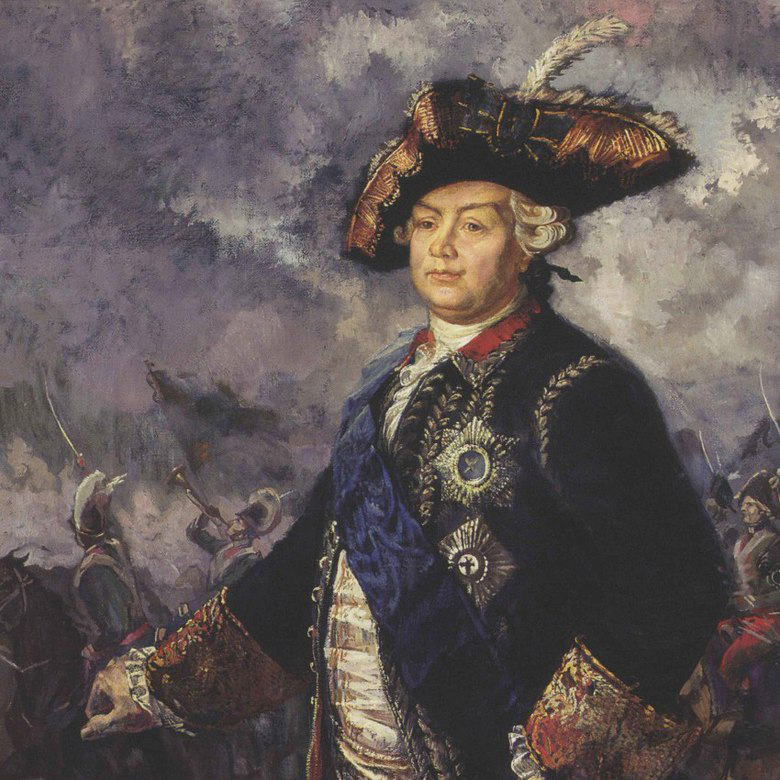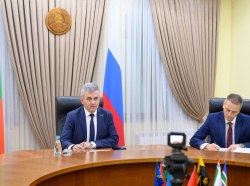Tiraspol, January 15. /Novosti Pridnestrovya/. In the Pridnestrovian State University, the International Historical and Educational Project was decided to launch dedicated to the 300th anniversary of Peter Rumyantsev. It was announced during the forum, organized in honor of the anniversary of the Great Russian commander. There were representatives of the scientific community, museums, public organizations, the State Archive and the Department of Culture. They were joined by representatives of the Institute of Russian Abroad: the Director Sergey Panteleev and candidate of political sciences Igor Ivanenko.
The famous military leader and administrator Peter Rumyantsev, who played a prominent part in the history of Russia, was born on January 15 or on old style January 4, 1725. According to one version, which is confirmed by historical sources, his homeland is the Pridnestrovian village of Stroentsy.
As the acting head of the Department of History of the Institute of Public Administration, Law and Social and Human Sciences of PSU Sergey Fidelsky noted, Rumyantsev played one of the main parts in the events preceding the unification of Pridnestrovie and Russia. His victories in the Russian-Turkish war of 1768–74 contributed to the conclusion of the Kuchuk-Kainardzhiysky peace, according to which Russia strengthened its presence in the Black Sea and influence in the Balkans. Fidelsky drew attention to the fact that the image of Rumyantsev was immortalized in the historical memory, culture, bonistics and numismatics of Pridnestrovie.
In the Pantheon of Russian commanders, there is bust of Rumyantsev installed near the walls of the Bendery Fortress. His portrait is depicted on banknotes with a face value of 200 rubles and a commemorative silver coin with a face value of 100 rubles in the Russia in the History of Pridnestrovie series. The Russian general was also noted at the stand Outstanding Personalities of the Village of Stroentsy. The local museum, which was opened in 1985, is also named after Rumyantsev. The villagers offered the authorities to install a bust for their fellow countryman, but this initiative has not been pursued.
Igor Ivanenko, an expert at the Institute of the Russian Abroad, spoke in detail about how events took place that resulted in crucial political changes in Southeastern Europe. You can read more about this on the Russia and Compatriots website.
According to him, Rumyantsev`s diplomatic activity had a great influence on Pridnestrovie. The Kuchuk-Kainardzhiysky peace treaty, concluded by Rumyantsev in 1774 on behalf of Catherine II, led to the fact that the Russian border came close to Pridnestrovie and began to stretch along the Southern Bug River. According to another paragraph of the document, the Crimean Khanate became independent from Turkey, and Pridnestrovie (with the rest of the steppe Bug-Dniester) became part of it. However, in the second half of the 1870s, the Ottomans expelled the Khan administration from the Ochakov region. In 1779, the Ottoman affiliation of Bug-Dniester was officially fixed by the Russian-Turkish convention. If the conditions of the Kuchuk-Kainardzhiysky peace concluded by Rumyantsev in part of the Bug-Dniester region were not to be reviewed, then Pridnestrovie would become part of the Russian Empire not in 1792 (in the Treaty of Jassy), but nine years earlier (together with the Crimea, in 1783).
The famous Russian military leader became a collective image of the Rumyantsev-300 project. It is planned to be implemented in 2020 - 2025 using various formats. This is an international conference at PSU, preparation of a scientific publication, memorial trips to places of events of the Russo-Turkish war, lectures and seminars, organization of museum exhibitions, preparation of student works.
According to Irina Blagodatskikh, Associate Professor of the Department of the Institute of Public Administration, Law and Social and Humanitarian Sciences of PSU, the project will be devoted to the unification of Pridnestrovie and Russia as a whole, the heroic era of the second half of the 18th century, when the Russian Empire experienced its highs. According to her, the powerful advance of Russia in the Northern Black Sea region during the civilizational clash with the Ottoman Empire determined the fate of our region for several centuries to come. The result was the formation of a multinational Pridnestrovian community of peoples, the will of which created the Pridnestrovian Republic at the end of the 20th century.
Director of the Institute of Russian Abroad Sergey Panteleev believes that the popular version of Peter Rumyantsev`s birth in the Pridnestrovian village Stroentsy "is symbolically important for the Pridnestrovian mission in the Russian world." Panteleev emphasized that the current interest in the personality of Field Marshal Rumyantsev was associated with the Russians' search for their own identity, which is embodied, inter alia, in the life and work of great compatriots. In this regard, Peter Rumyantsev may well be considered one of the founders of the Russian world, since the geography of his military and administrative activities took place in Pridnestrovie and Bessarabia, Little Russia and historical Novorossiya, and was associated with the integration of these territories into the Russian space.
According to him, the Institute of Russian Abroad will actively contribute to the implementation of the Rumyantsev-300 project and provide it with expert and information support. Kaliningrad, one of the research centers for Peter Rumyantsev, will also connect to it. During the round table, the Dniester-Prut Information and Analytical Center, the Society of Historian Archivists of Pridnestrovie, the Institute of Social and Political Studies and Regional Development, and the Rybnitsa Museum Association expressed their readiness to take part in the project. The project will be coordinated by the Department of History of Pridnestrovian State University.








